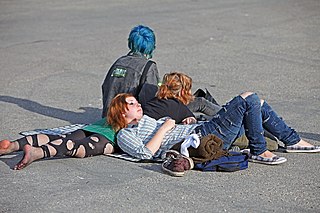
Cultural diversity is the quality of diverse or different cultures, as opposed to monoculture, the global monoculture, or a homogenization of cultures, akin to cultural evolution. The term "cultural diversity" can also refer to having different cultures respect each other's differences. It is often used to mention the variety of human societies or cultures in a specific region, or in the world as a whole. It refers to the inclusion of different cultural perspectives in an organization or society.
Transculturation is a term coined by Cuban anthropologist Fernando Ortiz in 1940 to describe the phenomenon of merging and converging cultures. Transculturation encompasses more than transition from one culture to another; it does not consist merely of acquiring another culture (acculturation) or of losing or uprooting a previous culture (deculturation). Rather, it merges these concepts and instead carries the idea of the consequent creation of new cultural phenomena (neoculturation) in which the blending of cultures is understood as producing something entirely new.

The Tour of Flanders, also known as De Ronde, is an annual road cycling race held in Belgium every spring. The most important cycling race in Flanders, it is part of the UCI World Tour and organized by Flanders Classics. Its nickname is Vlaanderens Mooiste. First held in 1913, the Tour of Flanders had its 100th edition in 2016.

Intercultural relations, sometimes called intercultural studies, is a relatively new formal field of social science studies. It is a practical, multi-field discipline designed to train its students to understand, communicate, and accomplish specific goals outside their own cultures. Intercultural relations involves, at a fundamental level, learning how to see oneself and the world through the eyes of another. It is seeks to prepare students for interaction with cultures both similar to their own or very different from their own. Some aspects of intercultural relations also include, their power and cultural identity with how the relationship should be upheld with other foreign countries.

Cultural identity is a part of a person's identity, or their self-conception and self-perception, and is related to nationality, ethnicity, religion, social class, generation, locality or any kind of social group that has its own distinct culture. Cultural identity is a fluid process that is changed by different social, cultural, and historical experiences. Some people undergo more cultural identity changes as opposed to others, those who change less often have a clear cultural identity. Those who change more, should be commended for seeing changes that need to be made in their life, for what fits them best. This means that they have a dynamic yet stable integration of their culture.
Interculturalism is a political movement that supports cross-cultural dialogue and challenging self-segregation tendencies within cultures. Interculturalism involves moving beyond mere passive acceptance of multiple cultures existing in a society and instead promotes dialogue and interaction between cultures. Interculturalism is often used to describe the set of relations between indigenous and western ideals, grounded in values of mutual respect.
Intercultural communication is a discipline that studies communication across different cultures and social groups, or how culture affects communication. It describes the wide range of communication processes and problems that naturally appear within an organization or social context made up of individuals from different religious, social, ethnic, and educational backgrounds. In this sense, it seeks to understand how people from different countries and cultures act, communicate, and perceive the world around them. Intercultural communication focuses on the recognition and respect of those with cultural differences. The goal is mutual adaptation between two or more distinct cultures which leads to biculturalism/multiculturalism rather than complete assimilation. It promotes the development of cultural sensitivity and allows for empathic understanding across different cultures.
Cross-cultural may refer to
Cultural pluralism is a term used when smaller groups within a larger society maintain their unique cultural identities, whereby their values and practices are accepted by the dominant culture, provided such are consistent with the laws and values of the wider society. As a sociological term, the definition and description of cultural pluralism has evolved. It has been described as not only a fact but a societal goal.
Cultural intelligence or cultural quotient (CQ) is a term introduced by London Business School professor P. Christopher Earley and Nanyang Business School professor Soon Ang in their textbook Cultural Intelligence: Individual Interactions Across Cultures, which describes "a person's capability to adapt as she interacts with others from different cultural regions", and has behavioral, motivational, and metacognitive aspects.
Cultural competence, also known as intercultural competence, is a range of cognitive, affective, and behavioural, linguistic, skills that lead to effective and appropriate communication with people of other cultures. Intercultural or cross-cultural education are terms used for the training to achieve cultural competence.
A cultural universal is an element, pattern, trait, or institution that is common to all known human cultures worldwide. Taken together, the whole body of cultural universals is known as the human condition. Evolutionary psychologists hold that behaviors or traits that occur universally in all cultures are good candidates for evolutionary adaptations. Some anthropological and sociological theorists that take a cultural relativist perspective may deny the existence of cultural universals: the extent to which these universals are "cultural" in the narrow sense, or in fact biologically inherited behavior is an issue of "nature versus nurture". Prominent scholars on the topic include Emile Durkheim, George Murdock, Claude Lévi-Strauss, and Donald Brown.

Etienne Vermeersch was a Belgian moral philosopher, skeptic, opinion maker and debater. He is one of the founding fathers of the abortion, euthanasia law, and the Law on Patients' Rights in Belgium. Vermeersch became an atheist after five years with the Society of Jesus (Jesuits). Later he became a philosophical materialist. In January 2008, Vermeersch was chosen by hundred prominent Flemings as the most influential intellectual of Flanders. He died in a hospital in Ghent on 18 January 2019 by euthanasia after a long illness.

Culture is an umbrella term which encompasses the social behavior, institutions, and norms found in human societies, as well as the knowledge, beliefs, arts, laws, customs, capabilities, and habits of the individuals in these groups. Culture is often originated from or attributed to a specific region or location.

Cultural sensitivity, also referred to as cross-cultural sensitivity or cultural awareness, is the knowledge, awareness, and acceptance of other cultures and others' cultural identities. It is related to cultural competence, and is sometimes regarded as the precursor to the achievement of cultural competence, but is a more commonly used term. On the individual level, cultural sensitivity is a state of mind regarding interactions with those different from oneself. Cultural sensitivity enables travelers, workers, and others to successfully navigate interactions with a culture other than their own.

Multiculturalism in Canada was officially adopted by the government during the 1970s and 1980s. The Canadian federal government has been described as the instigator of multiculturalism as an ideology because of its public emphasis on the social importance of immigration. The 1960s Royal Commission on Bilingualism and Biculturalism is often referred to as the origin of modern political awareness of multiculturalism, resulting in Canada being one of the most multicultural nations in the world. The official state policy of multiculturalism is often cited as one of Canada's significant accomplishments, and a key distinguishing element of Canadian identity and Canadian values.

Theo Peeters was a Belgian neurolinguist who specialised in autism spectrum disorders. During his career he emphasised the importance of understanding the "culture of autism", of empathising fully with individuals on the spectrum. He was the founder of the Opleidingscentrum Autisme in Antwerp, Belgium.
Raymond Detrez is Professor of East European history and cultures and modern Greek history at the University of Ghent, Belgium.

Oswald J. Werner, known as Ossy, was a Professor of Anthropology and Linguistics for thirty years at Northwestern University and retired in 1998 as Professor Emeritus of Anthropology and Linguistics. During this period he researched the Navajo language and culture. Although specializing in their medicine and science, he impacted anthropology, linguistics, ethnography, ethnographic methodology, ethnoscience, and cognitive anthropology.

The second running of the Tour of Flanders cycling race in Belgium was held on Sunday, 22 March 1914. Belgian Marcel Buysse won the race in a sprint of a seven-strong group on the velodrome of Evergem, part of Ghent. 19 of 47 riders finished. The race started and finished in Ghent.










